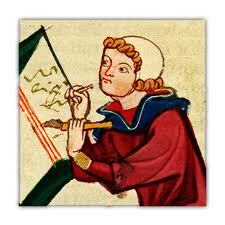An Idealistic Inquisitor: Dominican Friar Umberto di Sante
Ultimately, the domineering and omnipresent protagonist in any tale about the destruction of the Knights Templar is the King of France, Philip IV. A book that included him as a character, dissecting his motives and strategy, would undoubtedly make a intriguing contribution to literature on the topic. But I did not choose that path. In The Tale of the English Templar, Philip VI remains ominously in the background. The protagonist of the novel is instead one of his servants -- an idealistic young man whose ambitions lead him astray.

In this excerpt, the student Umberto di Sante is found walking out in the streets of Poitiers with the noble maiden Felice de Preuthun. He is the son of a Sicilian noble house, in Poitiers to study and 'make connections' to enable a career. Although as a student he is classed as 'clergy' and subject to canon rather than secular law and authorities, he has not yet taken monastic vows.
The Dean,Monseigneur Michel de Saint Laurent, was a man in his early forties. He was avigorous man, built more like a smith or a longshoreman than a priest. He hadbroad shoulders, thick, muscular arms and a stride that shook the earth as ifan elephant were angry. More important, though not a man of noble birth, he wasa relation on his mother’s side of the King’s most influential minister, Keeperof the Privy Seal, Guillaume de Nogaret. It was no secret that he wasdesignated for the bishopric of Albi as soon as the present incumbent finallysuccumbed to the sickness that had incapacitated him for months.
Felice dipped herknee and bowed her head demurely to the powerful priest.
“The ReverendMother is looking all over for you, mademoiselle!” the Dean told her sternly.“She was about to send out search parties. Report to her at once and pray theVirgin inspires her with mercy.” He dismissed her with a quick flick of hishand. Felice dropped another curtsey and with a hasty, almost inaudible “Adieu”to Umberto, she collected her skirts and ran across the cathedral court,heading for the Convent of Saint Radegonde beyond.
Umberto,embarrassed to be discovered by such a prominent churchman in a potentiallycompromising situation, also bowed and started to take his leave, but theMonseigneur had him firmly by the elbow and started to lead him forcefullytowards the cathedral. “Not so fast, young man. I intend to take a stroll inthe cloisters, and you will accompany me.”
Umberto couldhardly say no, and a part of him was even excited. It was not every student whotook an afternoon stroll with the Dean of Poitiers Cathedral. His colleaguesnever need learn the reason or the content of their discussion. He fell inbeside the Dean and paced himself to match the stride of the senior cleric.
“I’ve beenwatching you for some time, di Sante,” the Dean commenced before they hadreached the cathedral. “You’re an ambitious young man.”
Umberto wasflattered — and impressed that the Dean had noticed, given how little contactthey had had with one another.
The Dean shovedopen the door of the cathedral. It banged loudly; the echo vibrated in thesoaring arches overhead, but the Dean was not in the least distracted. Hemarched across the nave with only the barest hint of a genuflection towards thealtar, heading to the door leading out into the cloisters at the base of thetransept opposite. The fact that mass was being read in the choir disturbed himnot in the least. They entered the tranquillity of the cloisters where the pureRomanesque arcade framed the bubbling fountain in the centre of the garth withits clipped grass.
The Dean had noparticular affinity for beauty. He pounded his way over the graves of deceasedpriests as if he were intent upon wearing away even the simple crosses with theChristian names and dates. “You selected the books for copying not merely on thebasis of the condition of the pages but on the basis of content.” TheDean willingly revealed one of the reasons he was impressed by Umberto.
Umberto notedthis with satisfaction, remembering that he had explained before he was askedthe reason why he recommended the copying of various volumes. At the time, theDean had appeared uninterested and even irritated; now Umberto was gratified tolearn that his effort to attract attention had been more successful than he haddared hope.
“You have a goodhead on your shoulders,” the Dean continued in a matter-of-fact tone. “Yourprofessors assure me of that.” He glanced at the young man next to him and hiseyes narrowed a bit. The boy’s face was too pretty by far. Monseigneur Michelwas not himself a good-looking man: his face was too round, his lips too thickand his nose too stubby for that. But everyone had their faults, he remindedhimself and continued, “It seems to me that you have a great number of optionsopen to you.”
Umberto’s bloodquickened in his veins. Never in his wildest dreams had he thought he mightobtain patronage and opportunity so early. He had only been at the universityfor three years. Many youths studied for ten without attracting particularfavour. While his family was rich enough to secure him a church benefice or aposition in a monastery in Sicily, Umberto couldn’t bear the thought of endingthere, so far from the seat of power.
“You will havegiven thought to your future,” the Dean surmised. “What is it you actually wantout of life?”
Umberto wasembarrassed to admit the dreams that filled him. He could hardly tell a man whohad not yet gained the bishop’s staff that he aspired so high. He reduced hissights accordingly: “A university chair —"
“I thought youhad more sense than that! Do you want to spend the rest of your life arguingabout how many angels can stand on a pinhead?” The disapproval was patent.
“Well, no, I —”
“Let’s not playstupid games with one another. You’re too good for that. You know damn wellthat power lies not in the universities, much less the parishes. There are onlytwo routes to power — the papal court or the crown. You can serve the Pope orthe King of France – and to be honest that is one and the same thing since theKing controls the Pope. To serve the King is the more direct route to reward.”
Even Umberto wastaken aback by the directness of this speech. To be sure, all the studentstalked among themselves about Clement’s utter subservience to Philip IV, butthey always kept their voices down and looked over their shoulders when theyspoke.
“The King hasurgent need of intelligent clerics who are willing to follow his lead withoutany mealy-mouthed prevarication. He’s going to have particular need of them inthe near future. Did you like the sermon by Father Elion, by the way?” The Deanstopped abruptly and asked the question out of the blue.
“Yes. Very much.The man has brilliant rhetoric and real courage. The Bishop did not lookpleased,” Umberto added with a touch of a smile.
The Dean laughedheartily. “No, the bishop was not unduly pleased, but that hardly matters.Norgoret is impressed by Father Elion. He is a man who has a nose for the seatof evil and the fanaticism to root it out.” Umberto wondered how the Dean knewthis, but already the Dean was continuing. “Don’t forget that the King is avery devout man. He cannot abide heresy.”
This was hardly asecret. Philip IV had not hesitated to accuse Pope Boniface VIII of heresy. TheKing had then proceeded to have the Pope arrested — by troops under the commandof Nogaret. Pope Boniface had died not very long afterwards — whether of poison,fear or merely despair was a matter of much lively speculation among thestudents.
“Now,” the Deancontinued purposefully, “for a young man eager to rise rapidly in the Church,there are a number of options. The most obvious course — and therefore, the onemost unimaginative youths pursue — is to become attached to the papal court.”
Umberto wasanxious to show that he was not so ‘unimaginative’ and now spoke up. “My familysupported Charles of Anjou. I intended —”
“Anjou may be theKing’s brother but make no mistake about his influence. The King wants hisbrother to become Holy Roman Emperor to increase his own power. Charles deValois is a cultivated, intelligent man but he has none of his elder brother’sruthlessness.”
Umberto had notnoted that Anjou conducted the campaign in Sicily with particular mildness, buthe knew better than to contradict.
“What you need todo, di Sante, is to join the Dominicans. That is the order most favoured by theKing and all his confessors have been and will be Dominicans.”
The idea of beingthe confessor of a king had never crossed Umberto’s mind, but he liked theimage instantly.
“There is aproblem.” The Dean stopped abruptly and turned to confront Umberto so directlythat the young man took a step back in shock. “You must enter holy orders — youmust become a priest — and you cannot have any female casting a shadow overyour career.”
Umberto blushedagainst his will. “You misunderstood. I saw Mademoiselle de Preuthune alonebefore Notre Dame. I merely offered to escort her back to the convent. We have—"
“I amMademoiselle de Preuthune’s confessor, di Sante. You don’t need to tell me thatshe is not only still a virgin but a sincerely modest maiden. But listencarefully: there is no woman in Poitiers who is more dangerous for you than thePreuthune maid.”
“Monseigneur! Idon’t understand. Of all the maidens now at the convent, she is the mostgenuinely interested in learning —”
“The girl is muchtoo intelligent for her own good! She has a better mind than nine-tenths of thestudents at the university! You don’t have to tell me that. And she reads Greek— which I dare say is more than you can do. But that is exactly why sheis dangerous. She’s not a girl you can use and discard. Her father is arespectable nobleman, her brother is on his way to becoming one of the leadingtournament champions of France, and, to top it off, her grandfather wasknighted by Saint Louis himself. I happen to know her grandfather, di Sante; hemay be over seventy, but he is fearless. If you dishonour the girl, you can besure that he will not hesitate to go to the King himself. Do you want to endlike Abelard?”
Umberto blushed.
“No. You don’t.Look, if I know anything about Sicily, you ploughed more than one furrow beforeyou left home. No one says you have to stop. You have the kind of face girlslike.”
Umberto swallowedawkwardly, unsure if he were expected to admit that he regularly took advantageof this fact.
“I see youhaven’t been fasting.” The Dean read his expression correctly. “No one is goingto blame you for that. Not even after you take higher orders. You don’t thinkthe whores of Poitiers live from secular customers alone, do you? But in thename of God, keep away from maids like Felice d Preuthune. The most importantrule is never sleep with a woman who hasn’t spread her legs for dozens ofothers. Whether she’s a whore or just a woman of low birth or morals, never,never give a woman the chance to claim convincingly that you are the father ofher bastard.”
As abruptly as hehad addressed Umberto, the Dean seemed to tire of him. He stepped back. “I hopeyou have fully understood me,” the Dean declared, and then waved Umberto away.
The Tale of the English Templar is available in paperback and ebook format from all major online retail platforms.

An escaped Templar,an intrepid, old crusader, and a discarded brideembark on a quest for justice inthe face of tyranny. Find out more at on my website Buy on amazon.com Buy on Barnes and Noble



